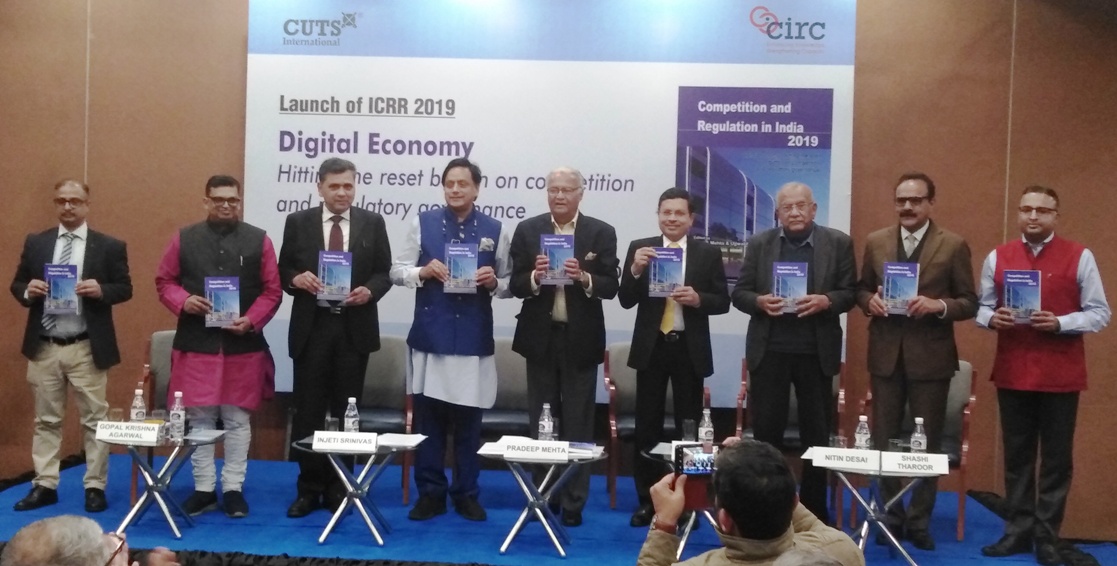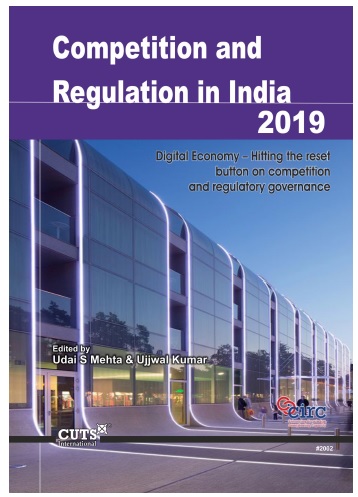India Competition and Regulation Report (ICRR 2019)
Digital Economy – Hitting the Reset Button on Competition and Regulatory Governance
ICRR-VII Cycle(2019)
What’s New
Report
ICRR 2019 – Synopsis
The ICRR 2019, with the theme ‘Digital Economy – Hitting the reset button on competition and regulatory governance’, throws light on some very important facets of regulation and competition that are still not settled in the emerging digital economy like India. While the Chapter 1 provides an overview and Chapter 2 depicts survey-based perception and awareness about competition and regulation among general masses, the other chapters (i.e. Chapters 3 to 9) are contributions from domain experts on various India-centric regulatory and competition issues in the digital economy. The last chapter (i.e. Chapter 10) is Epilogue presenting a way forward. The following paragraphs illustrate the core chapters (i.e. Chapters 3-9).

Chapter 3: Antitrust in the Digital Era: Rethinking Dominance and its Abuse
– Raju Parakkal, Associate Professor, Thomas Jefferson University, Philadelphia
This Chapter examines the growth of the digital economy and its corporate titans—globally and in India—and evaluates the implications of that growth and dominance for antitrust analysis. It flags the challenges to the consumer welfare standard in the antitrust analysis and the importance of data availability across the economic sphere. It argues that antitrust should no longer be only about consumers in the relevant market because the impact of its decisions extends beyond consumers to the larger society.
Chapter 4: Buyer Power, Competition Law and Platforms
– Subhashish Gupta, Professor, Indian Institute of Management, Bangalore
This Chapter deals with competition concerns in monopsony markets that may tend to reduce the price paid to suppliers and to restrict the amount that is bought. It highlights the lack of sufficient jurisprudence in dealing with abuse of dominance in monopsony markets (buyers’ power), which includes modern-day big digital platforms. The Chapter analyses buyer power and its effect on consumer welfare, as well as the interface between competition law and buyer power.
Chapter 5: Personal Data and Consumer Welfare in the Digital Economy
– Smriti Parsheera and Sarang Moharir, researchers at NIPFP, New Delhi
This Chapter discusses the importance of consumer welfare in the digital economy, spanning across the fields of competition, consumer protection and data protection laws. It also discusses the interactions between these fields as well as the complementarity and differences in their approaches. The Chapter highlights differences in the design and scope of the interventions under each framework. It argues that continuing with a silo-based approach is not going to ensure the overall welfare of consumers in the digital economy and that an appropriate legal and institutional mechanism to facilitate interactions across these fields is the need of the hour.
Chapter 6: Contemporary Regulatory and Competition Concerns for E-commerce in India
– A Didar Singh, Senior Fellow, Delhi Policy Group and Ujjwal Kumar, Policy Analyst, CUTS International
This Chapter, recognising the potential of e-commerce for generating new opportunities for micro, small and medium enterprises (MSMEs) and farmers, analyses various contemporary regulatory and competition concerns that the sector is facing in India. Most of such concerns are interlinked. It advocates both ex-ante regulation and ex-post case-by-case competition enforcement in dealing with such concerns. It also advocates the adoption of NCP.
Chapter 7: Challenges Associated with the Market Definition Process on E-commerce Platforms: Why Bother with a Market Definition?
– Ebru Ince, Competition Expert, Turkish Competition Authority, and Cihan Dogan, Attorney-at-Law and Ph.D. Candidate at Istanbul Bilgi University, Turkey
This Chapter analyses the challenges of adopting traditional tools to define the market and assess market power in multisided markets, and the adverse effects of erroneous market definition on the competition. It argues that due to inherent problems associated with the market shares calculation of the multi-sided markets, consideration of other factors as a proxy for the purpose of market power assessment may be adopted. In this regard, the economic factors such as network effects, feedback effects and multi-homing could play more significant roles for multi-sided markets. Since these factors do not require a precise market definition, the necessity of defining a relevant product market in the case of multi-sided markets can be questioned.
Chapter 8: Regulatory Framework for the National AI Marketplace
– V. Sridhar, Professor, IIIT, Bangalore, and Kotta Hari Chandana, Intuit
After deliberating upon the architecture of National Artificial Intelligence Marketplace (NAIM), this Chapter provides contours of possible guidelines for the platform to be sustainable, trustworthy, scalable, immutable, secure and accurate; and indicative policy and regulatory framework for addressing privacy, security, ethics and quality of data in the platform.
Chapter 9: Relevant Market and Market Power in Ride Sharing Industry
– Garima Sodhi, Senior Fellow, and Rinki Singh, Research Associate, CIRC, New Delhi
This Chapter describes the ride-sharing industry ecosystem and suggests a new approach for defining the relevant market and assessing the market power using the traditional tools adapted to new markets, until new tools are developed for such markets. It concludes that the tools applied to define relevant market in traditional markets like SSNIP test, critical loss analysis, diversion ratios, conditional logit demand analyses etc. might not be effective in multi-sided markets, and also that market share may not be a suitable parameter in the assessment of market power in such markets.

